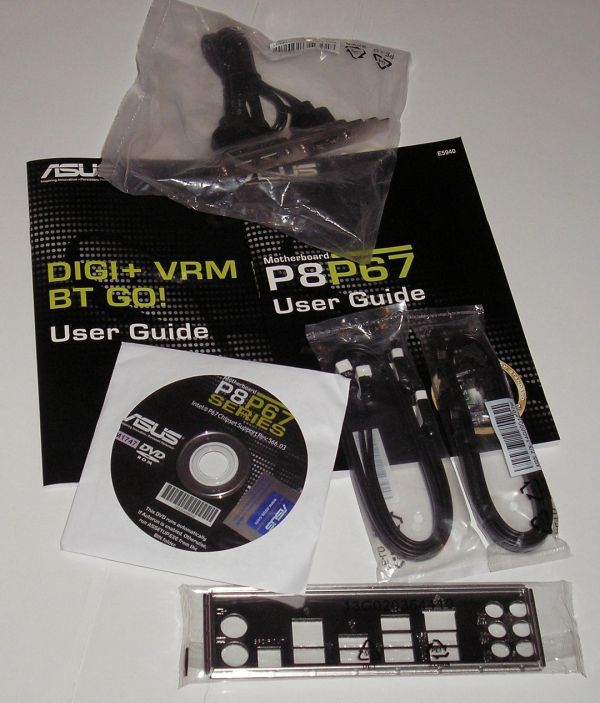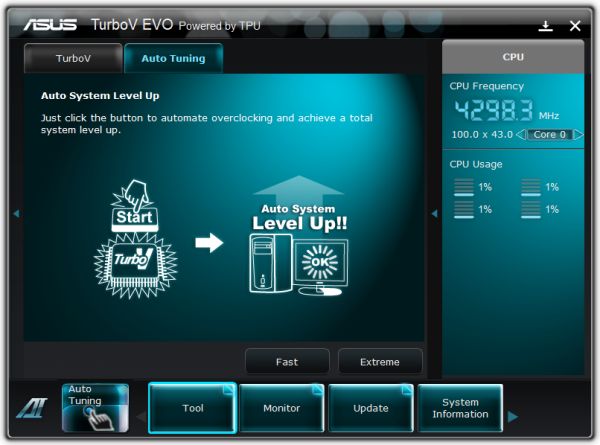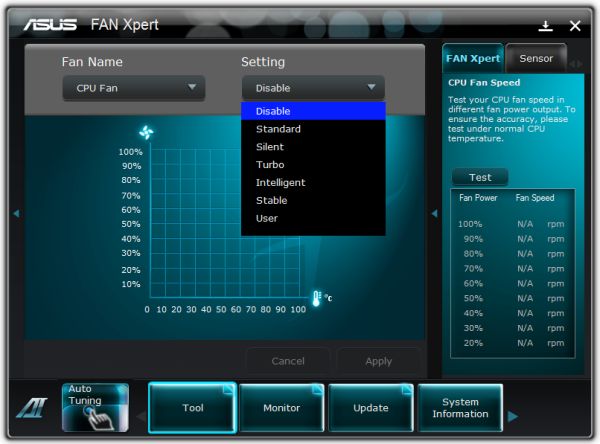ASUS P8P67 Review
by Brendan van Varik on September 8, 2011 10:45 AM EST- Posted in
- Asus
- Motherboards
- P67
Board Features
| ASUS P8P67 | |
| Market Segment | Performance |
| CPU Interface | LGA 1155 |
| CPU Support | Sandy Bridge i3/i5/i7 |
| Chipset | P67 |
| Base Clock Frequency | 38.0 MHz to 400.0 MHz in 0.1 MHz intervals |
| DDR3 Memory Speed | 1333 MHz by default, 800-2133 MHz supported |
| Core Voltage | Auto, offset or fixed modes, 0.800 V to 1.800 V in 0.015 V intervals |
| CPU Clock Multiplier | Dependant on CPU |
| DRAM Voltage | Auto, 1.108 V to 2.464 V in 0.007V intervals |
| DRAM Command Rate | Auto, 1T-3T |
| Memory Slots |
Four 240-pin DDR3 DIMM slots in dual-channel Regular unbuffered DDR3 memory Up to 32GB total supported |
| Expansion Slots |
2 x PCI Express 2.0 x16 slots (x16/x0 or x16/x4) 2 x PCI Express 2.0 x1 slot 3 x PCI slots Supports ATI Crossfire |
| Onboard SATA/RAID |
2 x SATA 6.0 Gb/s ports (gray) supporting RAID 0/1/5/10 4 x SATA 3.0 Gb/s ports (blue) supporting RAID 0/1/5/10 2 x SATA 6.0 Gb/s ports (navy blue) from Marvell 88SE9172 |
| Onboard |
4 x SATA 3Gb/s connectors 4 x SATA 6Gb/s connectors 4 x Fan Headers (1x4-pin, 3x3-pin) 3 x USB 2.0 headers support additional 8 USB 2.0 Ports 1 x Front panel switch/LED header 1 x TPM module connector 1 x USB3.0/2.0 header 1 x IEEE 1394a header 1x SPDIF Out header 1x Serial port header 1 x Firewire/IEEE 1394 header 1 x Front panel audio header 1x Clearing CMOS jumer |
| Onboard LAN | 1 x Realtek RTL8111E chip (10/100/1000 Mbit) |
| Onboard Audio | Realtek ALC889 Codec, 2/4/5.1/7.1-channel, Dolby Home Theater, S/PDIF Out |
| Power Connectors |
24-pin EATX Power connector 8-pin EATX 12V Power connector |
| Fan Headers |
1 x CPU Fan (4-pin) 3 x SYS Fan (3-pin) |
| IO Panel |
1 x PS/2 keyboard/mouse port 1 x optical S/PDIF Out connector 1 x DisplayPort 6 x USB 2.0/1.1 ports 1 x IEEE 1394a port 2 x USB 3.0/2.0 ports 1 x RJ-45 port 6 x audio jacks (Center/Subwoofer Speaker Out/Rear Speaker Out/Side Speaker Out/Line In/Line Out/Microphone) |
| BIOS |
1 x 32 Mbit flash Use of licensed AWARD BIOS Support for DualBIOS™ PnP 1.0a, DMI 2.0, SM BIOS 2.4, ACPI 1.0b |
| Warranty Period | 3 Years |
What’s in the box?
A users guide to the motherboard and DIGI+ VRM/BT GO!
Driver and utilities DVD
2x SATA 6Gb/s cables
2x SATA 3Gb/s cables
1x 2-port USB / 1 eSATA PCI bracket
1x 2-in-1 ASUS Q-Connector kit
I/O Shield
ASUS sticker
There are a few extras included with this motherboard. ASUS have kept it down to minimize costs and they did not include the USB 3.0 front panel with this motherboard although they do include it with their more expensive options. It is a shame; I would have liked to see one with this board, especially when you consider that the ASRock P67 Extreme4 comes with one and is in a similar price bracket.
Software
When it comes down to installing the software for the motherboard, you can choose to install the software one by one or you can install all of them at once. In this case, everything was installed to ensure a fair test. The installation was straight forward. If you select the ‘InstAll’ option, the computer will install all of the drivers and restart a total of three times during the process of installation.
ASUS AI Suite II
The AI Suite II has a vast amount of programs installed within it. The program initially loads in a thin bar which allows you access the various parts of it by clicking on whichever part of the software you wish to use.
The Auto Tuning feature that you can see on the left is something which will automatically overclock your PC for you. There are two different pre-sets which are ‘Fast’ and ‘Extreme’. I have been over these in detail with my experiences in the overclocking section of this review.
ASUS FAN Xpert allows you to create custom fan profiles. You can choose from various preset settings as well as a ‘user’ option which allows you to change the fans to your requirements. When you choose the user option, you can choose where and when the fans start to ramp up. In all fairness, there are enough options within the FAN Xpert to satisfy most people but every one of us may have a slightly different perception of what the ideal settings should be.
Finally, we have the Update and System Information tabs. They pretty much speak for themselves - you can update your EFI revision from within Windows using this feature. If you want to update your EFI using this method, do this at your own risk. The best way to ensure a flawless update is at default EFI settings. The ‘System Information’ tells you about your CPU, motherboard and RAM, sort of like an in-built CPU-Z.




















52 Comments
View All Comments
DanNeely - Thursday, September 8, 2011 - link
How are raid 5/10 supposed to work on the two gray SATA6GB ports? You need 3/4 drives to implement those levels.IanCutress - Thursday, September 8, 2011 - link
The ASUS website suggests you can build an array across all the PCH SATA3/6 ports, just not the controller ones.Ian
JonnyDough - Thursday, September 8, 2011 - link
Well that seems silly if your array only runs at SATA II speeds...LtGoonRush - Thursday, September 8, 2011 - link
How many people are going to be building RAID arrays out of more than two SATA600 SSDs? No HDD can even approach SATA300 speeds so it's not really an issue .etamin - Friday, September 9, 2011 - link
HDD burst speeds (reads) can surpass 3gbps. I just saw an article showing the Hitachi DeskStar 3TB 7K3000 can burst to about 5gbps...and just because you don't use more than two drives in a RAID array doesn't mean other people don't.WillR - Saturday, September 10, 2011 - link
He didn't say other people don't. He implied only few do. This is a $150 board, not an enthusiast model. Anyone willing to shell out a couple grand on their SSDs alone should look elsewhere for a board, or more likely an add-on PCI-e x8 card with REAL RAID support, to better suit their needs.DanNeely - Thursday, September 8, 2011 - link
Ok, that would make sense. The review could be clearer on the point though.Taft12 - Thursday, September 8, 2011 - link
mdadmDanNeely - Thursday, September 8, 2011 - link
Soft-raid is completely chipset irrelevant.hurrakan - Thursday, September 8, 2011 - link
Thanks for the review.But I wish it was a review of the P8P67 Pro... specifically the new 3.1 revision with USB 3 controllers by Asmedia (instead of NEC).
I prefer single-card graphics anyway - my GTX580 is enough for now :) Consoles have been holding back PC gaming for too long - PC games aren't very demanding on hardware these days :(